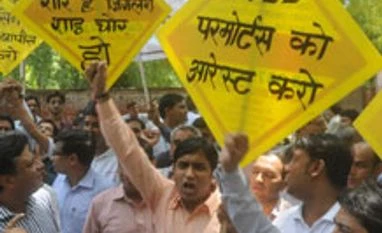The NSEL Investors Action Group (NIAG) and NSEL Investors Forum (NIF), claiming to represent the interest of 13,000-odd investors, have already petitioned the high court (HC) here, complaining of mismanagement of funds by the exchange and its brokers. Complaints have also been registered with various ministries and the city police’s economic offences wing (EOW) against various regulatory authorities, including the Securities and Exchange Board of India (Sebi) and the Forward Markets Commission (FMC) for not having done their job.
Now, investors have decided to target brokers individually, starting with five or six leading ones which dealt with NSEL in large volumes. Individual members of NIAG, in a meeting on Thursday, decided to file complaints in local police stations against individual brokers within two weeks.
Also Read
“We are preparing a format of criminal complaints, in consultation with legal experts. Our members will be filing formal complaints against leading individual brokers soon,” said Ketan Shah, a leading NIAG member. He has led a complaint to the HC in the name of two NSEL e-series investors, demanding monetising of metal stocks in e-series contracts and its even distribution among all (e-series and other) investors. The court is expected to club this with other NSEL cases and hear it on February 7.
These developments portend more problems for brokers. The EOW has already interrogated them on culpability in the overall Rs 5,600-crore scam.
“The forensic report by Grant Thornton and investigations by other agencies show brokers transferred investors’ money into the NSEL account without taking adequate security. It is, therefore, a breach of trust. The brokers should have called for warehouse receipts before transferring money into the NSEL account. From our information, the brokers only took an assurance from NSEL, for warehouse receipts which were never printed. We are only interested in recovering our money, wherever it comes from,” said Shah. “The primary duty of the brokers was to secure investors’ interest, which they failed to do.”
)